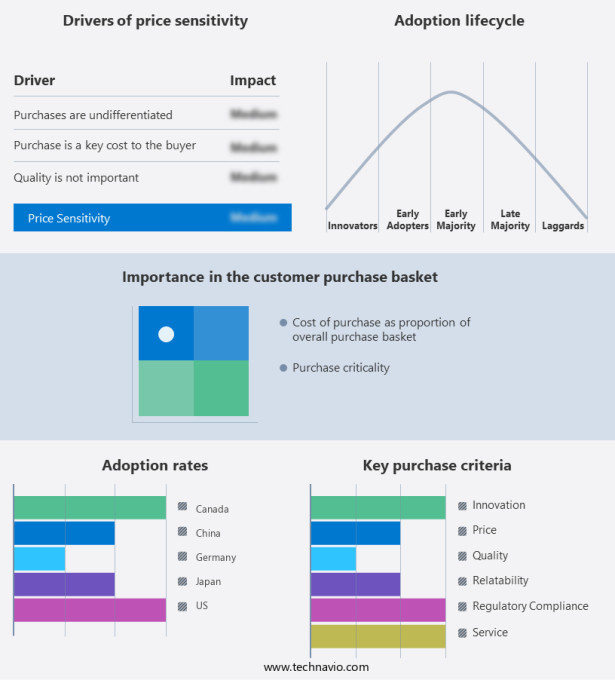Spirulina Market Size 2024-2028
The spirulina market size is forecast to increase by USD 211.3 billion at a CAGR of 8% between 2023 and 2028. The market is driven by the increasing health consciousness among consumers and the growing demand for naturally sourced nutritional supplements. This microalgae, also known as blue-green algae or cyanobacteria, is renowned for its rich nutritional profile, which includes high levels of protein, thiamin, riboflavin, antioxidants, and other essential nutrients. The ancient Aztecs and Africans have used spirulina for centuries due to its health benefits derived from photosynthesis. However, the high processing costs associated with producing spirulina supplements pose a challenge to market growth. Despite this, the market is expected to experience steady growth due to the increasing awareness of the health benefits of this unique algae.
Cyanobacteria, commonly known as blue-green algae, have been a subject of interest for centuries due to their unique ability to perform photosynthesis, a process that converts sunlight into energy. This microscopic organism has been a staple in ancient civilizations, such as the Aztecs, who utilized it as a primary food source. Today, the market potential of cyanobacteria extends beyond historical significance, as it offers numerous health benefits. Blue-green algae are rich in essential nutrients and antioxidants. They contain high concentrations of protein, thiamin, riboflavin, niacin, copper, iron, magnesium, potassium, manganese, and various vitamins and minerals.
Moreover, with a caloric count of approximately 100 calories per 10 grams, blue-green algae provide a balanced source of energy. Moreover, blue-green algae are an excellent source of essential fatty acids, including omega-6 and omega-3 fatty acids. These healthy fats contribute to heart health and brain function. Additionally, they contain all essential amino acids, making them a complete protein source. One of the most notable nutrients found in blue-green algae is vitamin B12. This vitamin is essential for the production of red blood cells and the maintenance of the nervous system. Blue-green algae are one of the few natural sources of this vitamin, making them a valuable addition to a vegetarian or vegan diet.
Similarly, the pseudovitamin B12, another nutrient found in blue-green algae, plays a role in the synthesis of DNA and RNA. It also supports the growth and development of red blood cells. Blue-green algae possess antioxidant properties, which help combat oxidative stress in the body. Phycocyanin, a pigment found in these algae, is a powerful antioxidant that neutralizes free radicals and reduces inflammation. Furthermore, blue-green algae have been shown to help lower cholesterol and triglyceride levels. They can also aid in maintaining healthy blood sugar levels, making them an attractive option for individuals with diabetes. In conclusion, the market potential of blue-green algae, or cyanobacteria, lies in their nutritional offerings.
Further, rich in essential nutrients, antioxidants, and essential fatty acids, these microscopic organisms provide a balanced source of energy and contribute to overall health and well-being. With their ancient history and modern health benefits, blue-green algae continue to be a valuable addition to the health and wellness industry. Keywords: blue-green algae, cyanobacteria, nutrients, antioxidants, protein, thiamin, riboflavin, niacin, copper, iron, magnesium, potassium, manganese, calories, carbohydrates, fat, omega-6 fatty acids, omega-3 fatty acids, essential amino acids, vitamin b12, pseudovitamin b12, antioxidant properties, anti-inflammatory properties, phycocyanin, oxidative stress, cholesterol, triglycerides.
Market Segmentation
The market research report provides comprehensive data (region-wise segment analysis), with forecasts and estimates in "USD million" for the period 2024-2028, as well as historical data from 2018-2022 for the following segments.
- Application
- Nutraceuticals
- Food and beverages
- Animal feed and pet food
- Cosmetics
- Others
- Geography
- North America
- Canada
- US
- Europe
- Germany
- APAC
- China
- Japan
- South America
- Middle East and Africa
- North America
By Application Insights
The nutraceuticals segment is estimated to witness significant growth during the forecast period. The market for spirulina supplements, derived from cyanobacteria or blue-green algae, is experiencing steady growth in the United States due to increasing consumer interest in natural health solutions. This microscopic organism, capable of photosynthesis, is rich in essential nutrients such as protein, thiamin, riboflavin, iron, calcium, and magnesium. Spirulina's antioxidant and anti-inflammatory properties make it a popular choice for those seeking immune support, increased energy, and overall wellness. Nutraceutical applications of spirulina are diverse, ranging from capsules and tablets to powders and liquid extracts. Its versatility allows for easy integration into various dietary supplements, functional foods, and beverages. The ancient Aztecs recognized spirulina's health benefits thousands of years ago, and today, it continues to be a valued addition to modern health and wellness regimens.
Incorporating spirulina into your daily routine can provide numerous health benefits, making it a worthwhile investment for those seeking to improve their overall well-being. With its rich nutrient profile and antioxidant properties, spirulina is a valuable addition to any health-conscious individual's supplement regimen.
Get a glance at the market share of various segments Request Free Sample
The nutraceuticals segment was valued at USD 163.40 million in 2018 and showed a gradual increase during the forecast period.
Regional Insights
North America is estimated to contribute 42% to the growth of the global market during the forecast period. Technavio's analysts have elaborately explained the regional trends and drivers that shape the market during the forecast period.
For more insights on the market share of various regions Request Free Sample
The North American market for spirulina is witnessing notable expansion due to escalating consumer preference for natural, plant-based nutritional supplements and the increasing popularity of sustainable health products. In the United States and Canada, spirulina is extensively utilized in the production of functional foods, beverages, and dietary supplements. The high protein content of spirulina makes it an alluring option for individuals seeking plant-based protein sources, aligning with the region's burgeoning trend towards vegetarian and vegan diets. Moreover, spirulina is increasingly incorporated into health-conscious products such as protein bars, smoothies, and snack foods, catering to the expanding consumer base seeking clean-label and minimally processed foods.
Moreover, the regulatory support for natural and organic ingredients in North America benefits spirulina producers, as health agencies like the FDA encourage the transparent labeling of such products. Spirulina is rich in essential amino acids, Omega-3 fatty acids, Vitamin B12, and Pseudovitamin B12. It boasts antioxidant and anti-inflammatory properties, attributed to the presence of phycocyanin. These properties aid in mitigating oxidative stress, making spirulina a valuable addition to a healthy diet. Furthermore, spirulina is known to help reduce cholesterol and triglyceride levels, making it a popular choice for those seeking to maintain heart health.
Our researchers analyzed the data with 2023 as the base year, along with the key drivers, trends, and challenges. A holistic analysis of drivers will help companies refine their marketing strategies to gain a competitive advantage.
Market Driver
Health benefits associated with spirulina products is the key driver of the market. Spirulina, a blue-green algae, offers numerous health benefits, fueling the expansion of the global market. Packed with essential nutrients, spirulina boasts a rich protein content, including all essential amino acids, making it a sought-after alternative protein source, particularly among vegetarians and vegans. This superfood is also renowned for its immune-enhancing properties, with antioxidants like phycocyanin aiding in the neutralization of free radicals, thereby safeguarding cells from oxidative damage and bolstering overall immune function. Moreover, spirulina's potential to improve heart health is noteworthy. By helping to lower LDL or "bad" cholesterol levels and triglycerides, while regulating blood pressure, spirulina plays a crucial role in reducing the risk of cardiovascular diseases.
Furthermore, its antioxidant properties contribute to skin health, making it an attractive addition to various health and wellness regimens. Rooted in traditional medicine, spirulina supplements have gained popularity as a natural remedy for various health conditions, including ulcerative colitis and weight management.
Market Trends
Growing demand for naturally obtained health supplements is the upcoming trend in the market. Spirulina, a type of blue-green algae, is renowned for its rich nutritional profile, making it an ideal ingredient in various health supplements. This microalgae is packed with essential vitamins and minerals, including phycocyanins, phosphorus, sodium, folate, choline, vitamin K, and vitamin A. The increasing awareness among consumers about the benefits of natural health supplements has fueled the demand for spirulina in the market. Manufacturers are capitalizing on this trend by incorporating spirulina into their product offerings. For instance, Vegetology, a leading innovator in health and beauty solutions, produces Opti3 Omega-3 EPA (eicosapentaenoic acid) and DHA (docosahexaenoic acid) supplements using microalgal particles.
Moreover, these supplements are vegan-friendly and offer a vegetable source of omega-3 fatty acids, which are vital for heart health and brain function. Moreover, spirulina's antioxidant properties make it an excellent addition to supplements aimed at boosting immunity and reducing inflammation. As the demand for natural and plant-based supplements continues to grow, the market for spirulina is expected to expand significantly. In conclusion, spirulina's nutrient-dense properties and growing consumer preference for natural health solutions make it a promising ingredient in the dietary supplement industry. Manufacturers are recognizing this trend and incorporating spirulina into their product offerings, leading to a thriving market for this versatile algae.
Market Challenge
High processing costs for spirulina is a key challenge affecting the market growth. Spirulina, a popular microalgae, is available in various forms, including powder, capsules, tablets, and liquid. Third-party testing is crucial to ensure the quality and safety of these products. Healthcare providers, registered dietitian nutritionists, and pharmacists often recommend spirulina for its nutritional benefits, which include essential fatty acids. However, the high production cost is a significant challenge for the market. The cost of processing spirulina from algal biomass, particularly in photobioreactors (PBRs), is lower than that of open water bodies. However, most spirulina is sourced from open water bodies, necessitating substantial capital and labor investments for product processing. To make microalgal production of spirulina economically viable, a multi-product biorefinery is essential.
However, this approach can help reduce processing costs and increase efficiency. The choice of processing method depends on the availability and cost of raw materials, as well as the desired end product. In conclusion, while spirulina offers numerous health benefits, the high production cost remains a significant challenge for the market. Implementing a multi-product biorefinery system can help address this issue and make spirulina production more economically feasible.
Exclusive Customer Landscape
The market forecasting report includes the adoption lifecycle of the market, covering from the innovator's stage to the laggard's stage. It focuses on adoption rates in different regions based on penetration. Furthermore, the report also includes key purchase criteria and drivers of price sensitivity to help companies evaluate and develop their market growth analysis strategies.
Customer Landscape
Key Companies & Market Insights
Companies are implementing various strategies, such as strategic alliances, partnerships, mergers and acquisitions, geographical expansion, and product/service launches, to enhance their presence in the market.
C.B.N. Bio engineering Co. Ltd. - The company offers spirulina in various forms such as spirulina powder, organic spirulina and many more.
The market research and growth report includes detailed analyses of the competitive landscape of the market and information about key companies, including:
- ALGATEC
- Algenol
- Cabassi and Giuriati SpA
- Cyanotech Corp.
- DIC Corp.
- Far East Microalgae Industries Co. Ltd.
- Fraken Biochem Co. Ltd.
- Fuqing King Dnarmsa Spirulina Co. Ltd.
- Givaudan SA
- Murugappa Group
- Prolgae Spirulina Supplies Pvt. Ltd.
- Qingdao Haizhijiao Biotechnology Co. Ltd.
- Sensient Technologies Corp.
- Synergy Natural Products Pty Ltd.
- TAAU Australia Pty Ltd.
- Tianjin Norland Biotech Co. Ltd
- Yunnan Green A Biological Project Co. Ltd.
- Zhejiang Comp Spirulina Co. Ltd.
Qualitative and quantitative analysis of companies has been conducted to help clients understand the wider business environment as well as the strengths and weaknesses of key market players. Data is qualitatively analyzed to categorize companies as pure play, category-focused, industry-focused, and diversified; it is quantitatively analyzed to categorize companies as dominant, leading, strong, tentative, and weak.
Research Analyst Overview
Cyanobacteria, also known as blue-green algae, have gained significant attention in the supplement market due to their unique nutritional properties. These microorganisms, which carry out photosynthesis, are rich sources of various essential nutrients, antioxidants, and phytonutrients. Spirulina, a popular type of cyanobacteria, is packed with protein, thiamin, riboflavin, niacin, copper, iron, magnesium, potassium, manganese, and a host of other vitamins and minerals. The nutritional benefits of spirulina extend beyond essential vitamins and minerals. It is also a rich source of omega-6 and omega-3 fatty acids, essential amino acids, vitamin B12, pseudovitamin B12, and antioxidant properties. Phycocyanin, a unique pigment found in spirulina, is known for its antioxidant and anti-inflammatory properties, which help combat oxidative stress.
Moreover, historically, spirulina has been used for centuries in traditional medicine to manage various health conditions, including ulcerative colitis, weight management, and cholesterol levels. In modern times, it is available in various forms, including powder, capsules, tablets, and liquid form. Consumers are encouraged to opt for third-party tested products to ensure quality and safety. Consulting a healthcare provider, registered dietitian nutritionist, or pharmacist is recommended before incorporating spirulina supplements into one's nutrition regimen. In summary, spirulina, a type of cyanobacteria, offers numerous health benefits due to its rich nutritional profile, including protein, essential vitamins, minerals, omega-3 and omega-6 fatty acids, vitamin B12, and antioxidant properties. Its historical use in traditional medicine and various forms of availability make it a popular choice for those seeking to improve their overall health and well-being.
|
Market Scope |
|
|
Report Coverage |
Details |
|
Page number |
140 |
|
Base year |
2023 |
|
Historic period |
2018-2022 |
|
Forecast period |
2024-2028 |
|
Growth momentum & CAGR |
Accelerate at a CAGR of 8% |
|
Market growth 2024-2028 |
USD 211.3 million |
|
Market structure |
Fragmented |
|
YoY growth 2023-2024(%) |
7.4 |
|
Regional analysis |
North America, Europe, APAC, South America, and Middle East and Africa |
|
Performing market contribution |
North America at 42% |
|
Key countries |
US, China, Germany, Canada, and Japan |
|
Competitive landscape |
Leading Companies, Market Positioning of Companies, Competitive Strategies, and Industry Risks |
|
Key companies profiled |
ALGATEC, Algenol, C.B.N. Bio engineering Co. Ltd., Cabassi and Giuriati SpA, Cyanotech Corp., DIC Corp., Far East Microalgae Industries Co. Ltd., Fraken Biochem Co. Ltd., Fuqing King Dnarmsa Spirulina Co. Ltd., Givaudan SA, Murugappa Group, Prolgae Spirulina Supplies Pvt. Ltd., Qingdao Haizhijiao Biotechnology Co. Ltd., Sensient Technologies Corp., Synergy Natural Products Pty Ltd., TAAU Australia Pty Ltd., Tianjin Norland Biotech Co. Ltd, Yunnan Green A Biological Project Co. Ltd., and Zhejiang Comp Spirulina Co. Ltd. |
|
Market dynamics |
Parent market analysis, market growth inducers and obstacles, market forecast, fast-growing and slow-growing segment analysis, COVID-19 impact and recovery analysis and future consumer dynamics, market condition analysis for the forecast period |
|
Customization purview |
If our market report has not included the data that you are looking for, you can reach out to our analysts and get segments customized. |
What are the Key Data Covered in this Market Research and Growth Report?
- CAGR of the market during the forecast period
- Detailed information on factors that will drive the market growth and forecasting between 2024 and 2028
- Precise estimation of the size of the market and its contribution of the market in focus to the parent market
- Accurate predictions about upcoming market growth and trends and changes in consumer behaviour
- Growth of the market across North America, Europe, APAC, South America, and Middle East and Africa
- Thorough analysis of the market's competitive landscape and detailed information about companies
- Comprehensive analysis of factors that will challenge the growth of market companies
We can help! Our analysts can customize this market research report to meet your requirements. Get in touch




